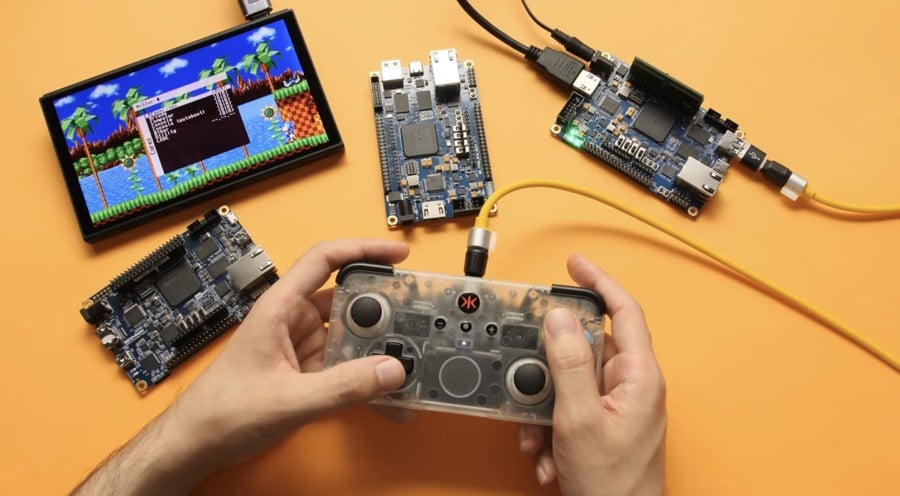
If you've been following the MiSTer FPGA scene for the past few years, you'll be aware that it's a remarkable piece of hardware which offers truly accurate retro gaming emulation — but you'll probably also know that it's really expensive.
The MiSTer is based around Terasic's DE10-Nano board, which, at the time of writing, costs around $225 directly from the manufacturer – a price that has risen steadily over the past few years. And that's before any other parts and components are added to the package, so you can see why MiSTer units are so costly right now.
That's why, when YouTuber and hardware modder Taki Udon stated that he was working on a MiSTer clone board that would cost around $99, it caused such a commotion in the world of FPGA retro gaming. Taki Udon, who is based in China, is working with a team that aims to totally disrupt the market for MiSTer systems – and we were lucky enough to chat with him about precisely how he's going to do it.
"I've wanted to make FPGA products for several years, but my old company never had enough bandwidth to work on them," says Taki Udon when asked about how this particular project got started. "When we were both looking for ways to work on something new together late last year, I pitched making a MiSTer successor with a more powerful FPGA. I started collecting feedback from people in the community about what they wanted/needed, and we started exploring what hardware we could use."
At the same time, Taki Udon and his team started working on a clone for the DE10-Nano "to get some familiarity with the hardware," This ended up becoming something that he felt could be sold to the public. "So we built a company and moved forward with it."
This new board will be a "1:1 replacement for MiSTer" and uses the same Cyclone-V FPGA processor manufactured by Intel subsidiary Altera. But how has Taki Udon been able to get to that magical $99 price point, exactly?
"The DE10-Nano's pricing strategy is completely different from ours, and their price is not a reflection of the hardware cost," he replies. "They have more mouths to feed and more expenses. Those expenses go into their products. We have lower overhead, and our goal is not to try and make a bunch of money from these boards. We just want it to be another resource that people can use if they want to get into MiSTer."
Taki Udon's board replaces some elements of Terasic's original design with cheaper parts; for example, the MiSTer's 128MB RAM module costs around $60, but Taki Udon's clone version (which uses the same Alliance RAM chips) should be closer to $15. Taking this into account, it's easy to see how this clone can sell for a lower price point than the original.
While Taki Udon's board will be a like-for-like replacement, he's keen to stress that there will be enhancements made to the existing DE10-Nano. "We made improvements to the power efficiency by swapping out some DC-to-DC components copied from the Altera development board. We also made improvements to the board layout to allow better connectivity between the boards that go below and above the main PCB."
More exciting is the fact that Taki Udon has teased other FPGA-based systems, including a $150 handheld which will challenge the Analogue Pocket and boast an AMOLED display. "These FPGA products are roughly 10% of my company's product portfolio," he explains. "We are in the process of making three consoles in a variety of form factors, and one handheld. They all share the same FPGA, but they all have unique features." The 'budget' model, for example, will accept physical cartridges.
While the main clone board is naturally going to compete with the MiSTer FPGA, it seems that Taki Udon and his team are also looking to disrupt other sectors of the FPGA gaming market. Analogue, for example, has the aforementioned Pocket, Super Nt, Mega Sg and Duo – all of which use FPGA chips and allow players to run their original carts and discs. However, outside of custom firmware and the OpenFPGA feature of the Pocket, Taki Udon feels there's likely to be a big difference between his cartridge-based offering and Analogue's line of systems.
"I think the biggest difference between the products that Analogue makes and these MiSTer ecosystem products is that most of Analogue's offerings are essentially walled gardens," he says. "With the exception of the Analogue Pocket, there is also no open source element, and they only do a single job. Their products are good at doing that one thing, but you don't have the same kind of freedom that you have with MiSTer hardware."
Taki Udon says that it will be a matter of months before his clone board will go on sale, and also points out that there's still plenty of testing to be done to ensure it lives up to its promise if being a 1:1 replacement for the current DE10-Nano, but one thing is clear – the world of FPGA gaming is never going to be the same again.
